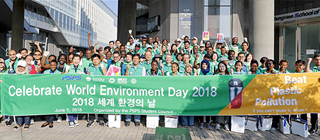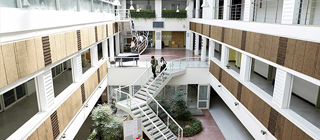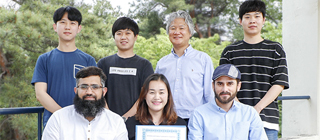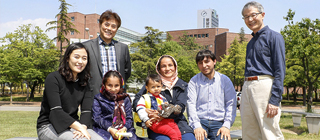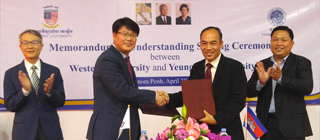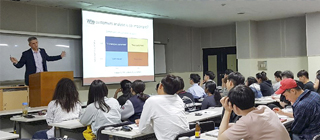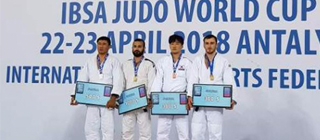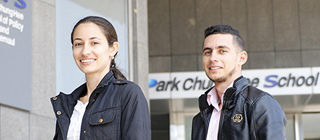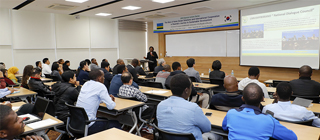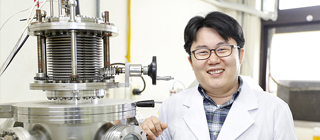-
-
School of Architecture saves 10 million won annually in power costs through the energy conservation campaign Looking to install ‘solar power generator’ with national funding... Taking the initiative for constructing a green campus “Need participation of everyone to create an energy-saving, eco-friendly campus” [May 29, 2018] <YU Mechanical Facility Situation Room> The YU School of Architecture (Dean Kwon Jong-wook) is reaping fruit from its energy conservation activities. The YU School of Architecture engaged in various energy conversation campaigns for students and faculty, which resulted in saving 24% of energy compared to the previous year (2016). When converting to annual electrical costs, this is a saving of more than 10 million won. The School of Architecture held regular meetings for professors, administrative office and student government and reached an agreement that it is necessary to conserve energy in the school. Through this, they began participating in energy-conservation activities in everyday life such as avoiding use of the design lab in late hours, turning off lights in classrooms when empty, avoiding unnecessary use of computers in the design lab, recommending limited use of heating and cooling facilities, attaching energy-saving stickers, disconnecting power cords for hot water in restrooms during the summer, etc. In result, energy consumption at the Architecture Hall (including the College of Engineering) dropped significantly from 204tCO2e (units converting electric power usage into carbon emissions) in 2016 to 156tCO2e in 2017. <See carbon dioxide emissions table below> <School of Architecture (Architecture Hall) energy consumption> ※ The above data is the conversion of electric usage into carbon emissions and it is information for constructing an eco-friendly campus by conserving energy and resources. The School of Architecture took another step to take the initiative for constructing a green campus. The School of Architecture was selected for the 2018 Renewable Energy Distribution (Building Support) project hosted by the Korea Energy Corporation. Through this project, the School of Architecture will install an annual 25MWh solar power generator using funds of 43 million won including 18 million won from national funding and from the development fund for the School of Architecture. It is estimated that this will save an annual 2.6 million won. YU Facilities Management Office Director Kim Moon-jae said, “We hope that in addition to our energy element tracking management, database construction and other activities, all of the members of the university will voluntarily participate in various energy conservation activities.”
-
Department of Information and Communication Engineering Professor Park Yong-wan’s research team participated in the smart-phone based localization system construction Recognized for world-class in indoor localization system-based technologies Large marketability such as expandability so expected to be used by both individuals and industries [May 29, 2018] <Department of Information and Communication Engineering Professor Park Yong-wan’s research team who took third place at the '2018 Microsoft Indoor Localization Competition'> (From bottom left: Muhammad Usman Ali, Heo Su-jeong, Ashraf Imran; from top left: Lee Chan-seok, Sohn Hee-dong, Professor Park Yong-wan, Kang Min-gyu) The indoor localization system developed by a research team from YU took third place in an international indoor localization competition hosted by Microsoft. At the 2018 Microsoft Indoor Localization Competition hosted by Microsoft in Porto, Portugal from April 10 to 11, Professor Park Yong-wan (57) of the YU Department of Information and Communication Engineering), Professor Heo Su-jeong (40) of the BK21+ project team, and graduate school students Muhammad Usman Ali (38, completed PhD course), Ashraf Imran (35, completed PhD course), Sohn Hee-dong (26, second semester in master’s degree program), Kang Min-Gyu (26, second semester in master’s degree program), and undergraduate student Lee Chan-seok (25, Department of Information and Communication Engineering, senior) won third place. This contest is on measuring the accuracy of real-time indoor position recognition systems. This is the fifth competition since first being held in Berlin, Germany in 2014. It is hosted and sponsored by global companies and research institutes such as Microsoft, Google, Intel, Bosch, and Carnegie Mellon University showing the global interest on indoor localization technologies. A total of 33 teams from 15 countries around the world participated in the first sector (2D localization) on smart-phone based localization system construction and the second sector (3D localization) on localization systems based on sensors. On the first day, lab environments were constructed and the stadium was analyzed and on the second day, locations were checked in real-time at the point designated by the host. The first sector that the YU team participated in was on measuring 2D location using smart phone sensor information and data in an environment without additional infrastructure. The contest was carried out by checking the location error of the localization system while freely walking 300 to 400 meters for about 15 minutes on the first and second floor of the Bolsa Palace in Porto, Portugal. The YU team exhibited a system of sending user location information confirmed through the Earth’s magnetic field sensor, Wifi, and walking navigation algorithms through a smartphone application that it developed. The YU team took third place from a total of 13 teams that participated in the first sector with a location accuracy of 3.2m, which was just 0.9m lower than the Israeli team that took first place. In particular, the technology developed by the YU research team received good reviews from participants for its expandability in terms of indoor localization system technologies and marketability. The research team said, “When using a smart phone camera and walking navigation localization, accuracy can be improved, but the power consumption of smart phones is high and there are also problems that real-time location information cannot be guaranteed in large indoor environments such as shopping malls due to the size of the data.” They added, “The YU research team solved the issue with unstable radio wave resource localization in indoor environments with the Earth’s magnetic field. After precisely setting the initial location with Wifi, this technology cannot provide real-time user location and therefore, it is the most suitable technology for constructing indoor navigation systems of smart phone users.” Recently, buildings are growing in size due to skyscrapers and shopping complexes, and underground spaces are also expanding with the development of subways. Therefore, indoor navigation is receiving attention as a core future technology and is expected to have significantly more uses and hence, the research results of the YU research team are receiving more attention. Professor Park Yong-wan who headed the research team said, “This proved that indoor location system-based technology possessed by YU is at a world-class level. YU’s technology, which was a runner up in last year’s ‘IPIN 2017’ procured both B2C and B2B marketability and it can thus be used as core technologies for the fourth industrial revolution.”
-
International student from Afghanistan Bashir’s daughter regains health with help of YU Help offered by YU Medical Center, Korean Red Cross, Sooryeon Rotary Club, etc. Visited YU and thanked in Korean... Wrote letter of appreciation “We will continue our ties with YU and Korea that gave new life and hope to our family” [May 11, 2018] <Bashir family studying at the YU Park Chung Hee School of Policy and Saemaul and faculty members> (From first on right Park Chung Hee School of Policy and Saemaul Kim Dean Gi-soo, Mr. Bashir, second from left Farzanah) “I never imagined that while studying in Korea I would be able to receive treatment for my sick daughter. Our entire family found happiness thanks to YU.” A 13-year-old girl with a disability from Afghanistan made news after regaining her health after an operation in Korea with the help of various institutes including YU. This is the story of the daughter of Mahmoodi Mohammad Bashir (31), who is currently studying at the YU Park Chung Hee School, and her name is Mahmoodi Farzanah (13). Miss Farzanah broke her leg during a C-section when she was being born in Afghanistan in March of 2005. After birth, she had complications such as osteoporosis and recurring fractures, but she was unable to receive proper treatment and ended up with a disability in her hip joint. Doctors and medical professionals recommended surgery and treatment in Afghanistan, but she was unable to receive the proper treatment due to various circumstances including financial difficulties. And then in March of last year, her father, Bashir, was selected as a scholarship student for the YU Park Chung Hee School official development aide (ODA). Mr. Bashir said, “I felt very sorry to leave my disabled daughter to come study in Korea. Even while studying, I was always worried about my daughter. I had a good relationship with YU professors and employees and we talked a lot, and one day I talked about my daughter. It was more than enough to just listen to me and give their console. When I later learned that they sought for help for daughter, I was very thankful.” After this statement, he took a long pause. Professors and employees at the Park Chung Hee School of Policy and Saemaul who learned about this looked for ways to give help. In January, a miracle happened when someone made a phone call to YU offering help. In fact, numerous institutes decided to help. The YU Medical Center, Korean Red Cross, and the Daegu Sooryeon Rotary Club notified that they would provide full costs for treatment. On March 26, Farzanah received a bone physeal plate suppression operation at the YU Medical Center. The operation was successful and she is currently recovering. Farzanah said, “I always missed my father who was studying in Korea. I never even imagined that I would be able to receive an operation in Korea where my father is studying. I want to run around and play with father now.” In the afternoon of May 10, Farzanah visited the YU Park Chung Hee School of Policy and Saemaul. She wanted to express her thanks to everyone who helped her. She said that she wanted to thank them in Korean. Farzanah, who came healthy, said thanks in quite accurate Korean. She also gave a letter that she wrote over night. Her appreciation to everyone who made it possible including YU Medical Center and the YU professors and employees was filled in this letter. YU Park Chung Hee School of Policy and Saemaul Administration Officer Choi Jung-ho said, “I didn’t expect her to thank us in Korean. I think this was the most fulfilling day while working at YU. I hope that Bashir’s family will have great memories about Korea when they return to their home country.” Bashir stated, “I am already excited about the new life that I will live with my healthy daughter once I graduate and return to Afghanistan. I hope to continue my relationship with YU and Korea that gave new life and home to our family.” Meanwhile, Farzanah was released from the hospital in April and is currently receiving treatment as an outpatient. She is scheduled to return to Afghanistan in mid-May. Her father Bashir is scheduled to graduate from the YU Park Chung Hee School in August of this year. YU Medical Center also agreed to provide support for continuous tracking and monitoring considering the fact that Farzanah is still growing. Even after Farzanah returns to Afghanistan, treatment will be provided remotely by taking x-rays in Afghanistan and sending the documents and data to the YU medical staff.
-
Pursuing to establish the Department of Saemaul Economic Development and Korean language courses at Western University Signed MOU for support on admissions of local high school students at YU with the Kampong Cham Province Education Office Discussions being held to promote exchange with the Royal University of Phnom Penh such as the 2+2 multiple diploma program, exchange student programs, etc. [2018-5-9] <An MOU was signed by YU and Western University of Cambodia for the establishment of the Department of Saemaul Economic Development, etc.> YU (President Sur Gil-soo) has set sail to export ‘education hallyu’. The Saemaul education program, which is a special education program, was exported to a university in the Philippines not long ago, and it will now be exported to Cambodia. It will also look to open Korean language and Korean studies classes in Cambodia as well. For this, the Outside Cooperation Office Director Heo Chang-deok, Park Chung Hee School of Policy and Saemaul Dean Kim Gi-soo, and International Exchange Team Leader Lee Won-young visited major institutes in Cambodia such as colleges, high schools, and education offices in Phnom Penh and Kampong Cham Province for five days from April 30 to May 4. The main purpose of this visit was to establish the Department of Saemaul Economic Development at a university in Cambodia. The YU envoy that visited Western University in Phnom Penh in the morning of the 30th signed an MOU for inter-collegiate international exchange with Western University President Kieng Rotana. A PR video introducing YU was shown and over 200 students, professors and employees who gathered at the auditorium cheered in congratulations of the MOU. Through this MOU, the two universities will focus on establishing the Department of Saemaul Economic Development at the Western University Kampong Cham Branch. For this, the YU envoy visited the Kampong Cham Branch on the next day (May 1) to draw up a road map for the establishment of the department with Western University Kampong Cham Branch Vice President Hok Thavuth. Debates were also held on the ‘Saemaul Undong’ with over 10 professors from the Kampong Cham Branch (photo on right). First, the Student Support Center Director and Professor Ouk Khamdy of the Kampong Cham Branch made a presentation on how the Saemaul Undong and Saemaul spirit should be spread in the Kampong Cham region. YU Park Chung Hee School Dean Kim Gi-soo made a general assessment in the discussions to plant the first seed of the Saemaul Undong in Cambodia. Afterwards, the two universities visited a remote island village, which is scheduled to be the setting for Saemaul Undong development, to check the overall circumstances while assessing the possibility for localizing the Saemaul Undong. On May 2, which was the third day of visits in Cambodia, the opening ceremony for the Center for Korean Studies (photo top) was held at the Western University Kampong Cham Branch. The Center for Korean Studies, which opened amidst the cheers of around 250 students, is expected to serve as a hub to teach about Korea to residents of Kampong Cham through Korean language programs and Korean study courses. The two universities also agreed to provide full cooperation such as exchange students, short-term study programs, overseas volunteer programs, and e-learning programs. Through its visit to Cambodia, YU also set a bridgehead to attract international students through exchange agreements with the Kampong Cham Province Education Office. The Kampong Cham Province Education Office showed a great deal of interest in the Park Chung School of Policy and Saemaul and the Saemaul education program offered by YU, as well as the scholarship programs for foreigners. They agreed to support admissions of local high school graduates to YU by signing an MOU with YU in the future. Afterwards, YU not only met with local universities and high schools, but also the ‘Teaching Training Center’, which is a training institute for elementary, middle and high school teachers of Kampong Cham Province to engage in PR activities for YU. <Seminar for students of the Teaching Training Center in Kampong Cham Province> YU President Sur Gil-soo said, “There is a lot of interest in Cambodia on not only Korean pop culture, but also the Saemaul Undong, Korean students, and Korean language.” He added, “Starting with the ‘Saemaul Science’ systematically established by YU, YU will be able to lead the ‘educational hallyu’ in Cambodia.” Meanwhile, a banquet was organized by YU alumni in Cambodia. Alumni who graduated from the Park Chung Hee School of Policy and Saemaul who returned to Cambodia to fill in important positions took time from their busy schedule to organize a banquet for the visitors from their alma mater. At the welcoming banquet, five graduates of the Park Chung Hee School, as well as eight central government officials from the education ministry, economic ministry, tourism ministry and foreign affairs ministry were present demonstrating the huge amount of interest on YU’s visit to Cambodia. In addition, YU visited its sister school, the Royal University of Phnom Penh and the CCKC (Cambodia-Korea Cooperation Center) to discuss concrete plans for promoting exchange such as activating the exchange student program, jointly conducting overseas volunteer programs, multiple-diploma programs, and to pursue international joint research. They also visited the PPIIA (Phnom Penh International Institute of Art) that is pursuing specialization of art education with the approval of the Cambodian education ministry, thus hinting the oncoming wave of Korean education that will sweep Cambodia in the near future.
-
Selected for the ‘Erasmus Plus’ program Professor and student exchange with Tsenov Academy of Economics of Bulgaria... 4,000 euros funded for each participant Tsenov Academy of Economics President visits as first exchange professor... Special lecture for undergraduate and graduate school students [May 4, 2018] <Tsenov Academy of Economics President Ivan Marchevski of Bulgaria giving a lecture to YU College of Business on the 3rd> YU (President Sur Gil-soo) is operating a professor and student exchange program with the support of the European Union. YU was selected for the EU’s ‘Erasmus (European Region Action Scheme for the Mobility of University Students) Plus Program’. In order to participate in the program, YU signed an MOU with The D.A. Tsenov Academy of Economics of Bulgaria in 2016. YU is operating the professor and student exchange program for the first time this year as part of the Erasmus Plus Program. Recently, YU Department of Public Administration Professor Kim Soon-yang was dispatched to the Tsenov Academy of Economics to hold a lecture and this time around, Tsenov Academy of Economics Department of Marketing Professor Ivan Marchevski visited YU for one week from May 1 to May 7. Professor Marchevski is scheduled to give 20 hours of special lectures and seminars for undergraduate and graduate school students during his visit. An exchange student program is being operated for the first time in the first semester of 2018 as well. Jang Sang-yoon (23), a senior at the YU School of Economics and Finance, was sent to Tsenov Academy of Economics, while Viktorov Zlatin Borisov (23) of Tsenov Academy of Economics will study at the YU School of International Economics and Business until June of this year. Professors and students dispatched to each university under the Erasmus Plus Program will receive 4,000 euros (app. 5.15 million won, exchange rate on May 3, 2018) each from the EU. In particular, the first exchange professor visiting YU under the Erasmus Plus Program, Professor Marchevski, is currently serving as the president of the Tsenov Academy of Economics. Through this exchange program, it is expected that exchange between the two universities will become much more active. YU President Sur Gil-soo said, “YU currently offers various exchange programs through MOUs with major prestigious universities such as Oxford of England, University of Strasbourg of France, as well as universities in the Netherlands, Norway and Spain. In particular, the Erasmus Plus Program is an exchange program accredited and supported by the EU and so there are high expectations for expanded global networks of the university.” He added, “We will pursue various exchange and cooperation programs with prestigious universities around the world, as well as in Europe in order to enhance the capacities of professors and students to a global level.” The Erasmus Program is a student exchange support program of the EU that began in 1987. The EU expanded the Erasmus Plus Program in January 2014 and has been support exchange programs in various areas such as education, research, youths, sports, etc. Universities in the EU support not only EU nations under the Erasmus Plus Program, but also professors, students and expert exchange programs with the US, Canada and Russia to foster the education and research capacities of universities within the EU. Professors visiting each university under the Erasmus Plus Program are given the opportunities to speak to students of the college they were invited to or conduct joint research with local professors.
-
Representing Korea in the IBSA Judo World Cup 2018 Third place in individuals under 81kg, first place in group competition Won all matches in group competition with ippon... Helped Korea win with unparalleled skills [May 3, 2018] <Kim Yoon-ho of YU (second from right) won the bronze medal at the 2018 IBSA Judo World Cup in Turkey> Kim Yoon-ho (22, senior in the Department of Special Physical Education) of the YU judo team won the bronze medal at the –81kg class in the 2018 International Blind Sports Federation Judo World Cup in Turkey. Mr. Kim took part in the 2018 IBSA Judo World Cup in Turkey to represent Korea from April 17 to 27. In this tournament, Kim placed third in the individuals and first place in the group competition. In the individual contests, Kim defeated his Japanese and French opponent in the round of 16 and quarter-finals, respectively. In the semi-finals, he lost against his opponent from Azerbaijan, but in the match for the bronze medal, he won the bronze medal with a bronze medal with a seoi-nage against his Russian adversary. In particular, Kim won all of his matches with ippon in the group competition to help Korea win the group competition. Kim Yoon-ho won the gold medal at the Grand Gran Prix Disabled Judo Tournament held in Kazakhstan in September of last year. In May of last year, he took first place in the individuals and group competition in the ‘2017 IBSA Asian Judo Championships’ held in Tashkent, Uzbekistan, thus demonstrating his world-class skills by conquering the Asian stage. There are high expectations for him to win medals at the 2018 Asian Para Games and the 2020 Paralympics.
-
Two students from Cuba, which has no diplomatic relations with Korea, joined the YU Park Chung Hee School of Policy and Saemaul Decided to quit work and study at YU to learn about ‘Saemaul’ and Korea’s development experience Goal of studying at YU to find plans to apply Saemaul international development that fits Cuba [April 5, 2018] <?xml:namespace prefix = "o" /> “We came to learn ‘Saemaul science’. We are confident that the Saemaul Undong and Saemaul spirit will be a great contribution to the development of our homeland, Cuba.” The international demand for Korea’s ‘Saemaul’ has begun in Cuba, a country that has no diplomatic relations with Korea. Two international students from Cuba enrolled at the YU Park Chung Hee School of Policy and Saemaul. Over 600 international students from more than 60 studies have enrolled at the YU School of Policy and Saemaul so far, but these are the first students from Cuba. They are Paneque Silva Pedro Valentin (30) and Leyva Leal Lisandra (29), who worked at public corporations in Cuba in computer applications. What made the computer engineers from Cuba decide to quit their job and study in the completely new field of ‘Saemaul science’? The reason for coming to Korea to study is clear. They wanted to learn Korea’s ‘Saemaul’ and development experience. They explained, “We are well aware of Korea’s rapid growth, unprecedented anywhere else around the world, since the 1970s. We also learned that the Saemaul Undong was the driving force behind Korea’s development at the time. Cuba, which is a socialist country, has had relatively little economic growth.” They added, “Our goal of studying here is to learn about the systematic theories of Saemaul and gain expertise in intranational development to find ways to apply it in the circumstances of Cuba.” It has only been about a month since studying at YU, but they are confident that they made the right choice. Pedro said, “The YU Park Chung Hee School of Policy and Saemaul has a global network that is very rare to be seen anywhere in the world. Students from many countries around the world are studying here. I already have high expectations just by the fact that I will be able to exchange various opinions with them and gain academic growth.” Lisandra said, “Most of the international students here have working experience in various fields such as public employees, employees in public corporations, social activists, etc. from around the world. Being able to study together with people having diverse academic and social backgrounds and sharing knowledge and experience with each other is a great learning environment for students majoring in international development.” Though they are just beginning their studies in a new academic field in an unfamiliar environment, they have a great interest in Korean culture as well. Pedro said, “I would also like to be able to see the industrial sites of Korea, which has developed to world-class levels, for myself as well. I have a lot of interest in cars and so if I have the chance, I would also like to visit a Korean automobile maker.” Lisandra said, “I am interested in traveling, but I have not been able to travel much due to various reasons. During my studies here, I would like to visit different cities of Korea and also gain diverse experience in Korean culture.” They said, “We believe that we must first know about the Korean culture and the Korean people to be able to gain deep understanding of Saemaul that started in Korea.” They also added, “We would like to learn about the Korean language and culture while studying here. We hope to make friends with not only international students we study with, but also with as many Koreans as possible.” Meanwhile, the YU Park Chung Hee School of Policy and Saemaul was established in November 2011 to foster Saemaul international development experts and local development experts for public employees and workers in public sectors in developing countries. Up until now, 477 people from 60 countries earned master’s degrees who are now working as international development and local development experts around the world. As of March 2018, there are currently 118 international students from 30 countries studying at YU.
-
Part of the ‘invited lecture series’ for international students at the Park Chung Hee School of Policy and Saemaul ‘Development policies and roles of international cooperation for sustainable growth’ “Rwanda’s ‘Umuganda’ similar to Saemaul Undong. Community participates for development” [April 6, 2018] Rwanda Ambassador to Korea Emma Isumbingabo (photo) gave a special lecture at YU. At this special lecture held at the YU Cheonma Art Center Grand Hall Room 307 at 1:30 p.m. on the 6th, over 70 people attended including international students from the YU Park Chung Hee School of Policy and Saemaul, and international students from Rwanda studying at other universities as well. A total of 24 international students from Rwanda graduated from the YU Park Chung Hee School of Policy and Saemaul up until now, and there are also 12 students from Rwanda at YU currently. Under the theme of ‘development policies and the role of international cooperation for sustainable growth in Rwanda’, Ambassador Isumbingabo spoke for about an hour on Rwanda’s development goals and policy directions, the role of international cooperation for the reconstruction of Rwanda, the Rwanda Umunganda Movement, and civic education. During the lecture, Ambassador Isumbingabo said, “’Umuganda’, which is one of Rwanda’s growth policies, has many similarities to Korea’s Saemaul Undong. ‘Umunganda’ refers to ‘working together to achieve a common goal’. Traditionally, family, friends and neighbors worked together to help solve difficult problems in Rwanda. This is similar to the Saemaul spirit of diligence, independence and cooperation.” She added, “Umuganda encourages community members to participate in community work and to bring the community to become one.” This special lecture is the first of the YU Park Chung Hee School of Policy and Saemaul’s invited lecture series. This lecture by the Rwanda Ambassador to Korea was made possible through an international student who was formerly a public employee in Rwanda and is currently studying at the YU Park Chung Hee School. The Park Chung Hee School is planning to hold special lectures on official development aid (ODA), international development cooperation and development experiences by inviting foreign ambassadors to Korea through the invited lecture series. <YU President Sur Gil-soo met with Rwanda Ambassador to Korea Emma Isumbingabo prior to the special lecture.> YU Park Chung Hee School of Policy and Saemaul Dean Kim Gi-soo said, “Being able to listen to lectures from the head of diplomatic envoys, who are in charge of international cooperation and make policies, and sharing the experiences of different countries will be practical and useful education for students majoring in Saemaul international development.” He added, “We will provide various special lecture programs so that Park Chung Hee School students from various countries will be successful as international development and local development after graduating.”
-
YU Professor Ryu Jung-ho’s team’s research results used as cover paper for ‘Energy & Environmental Science’ Succeeded in developing independent power technology for IoT wireless sensors that do not need batteries [April 5, 2018] Technology that uses energy from ‘magnetic field noise’ from electric power lines or around electronic devices’ to convert it to power was developed. The level is at a point that can operate Internet of Things (IoT) sensors, so it can be used in making ‘IoT devices without batteries’ in the future. According to the Ministry of Science and ICT on the 5th, the research results of Professor Ryu Jung-ho (photo, left) of YU, et al were placed on the cover of the April issue of the academic journal, ‘Energy & Environmental Science’. This research took advantage of the fact that because magnetic fields are created in conductors that have electric currents, electromagnetic noises are always generated in power lines or near electronic devices. The research team developed the technology to turn everyday magnetic field changes into electric energy by combining the magnetostriction material gallium-iron alloys and ‘piezo-electric materials’. Magnetostriction materials cause transformations due to changes in the magnetic field or changes the magnetoelectric features by applying pressure. Piezo-electric materials create voltage when pressure is applied or causes transformations when voltage is applied. The researchers used the principle that the properties of magnetostriction and piezo-electric material crystals change depending on the direction of its alignment to produce two materials with directions that change the most sensitively to electromagnetic fields, and the two materials were combined to design materials that maximized energy conversion efficiency. <Conceptual diagram of energy conversion elements used as the illustration for the cover of the April issue of the academic journal ‘Energy & Environmental Science’. This element that YU Professor Ryu Jung-ho, et al developed combines the magnetostriction metal material (bottom) that causes transformations due to magnetic fields and ‘piezo-electric materials (top) that generate electric energy through transformation to convert everyday magnetic field noises into electric energy. April 5, 2018 [Source: Ministry of Science and ICT]> New functions are added to the border (interface) created between the two or more materials to apply the ‘hybrid interface combination’ technology that adds various features. Through this, the researchers succeeded in generating DC power exceeding mW (milliwatt) that is the amount needed for constant operation of IoT remote sensors without batteries. Global Frontier Hybrid Interface Materials Director Kim Gwang-ho and Professor Ryu Jung-ho procured patent rights for the relevant technologies in Korea, USA, Europe, Japan and China. Professor Ryu emphasized, “We have reached a level to semi-permanently operate remote sensor networks, which required batteries until now, without batteries, so we expect that it will be used in wide ranges as an independent power source for wireless sensor networks for the future 4th industrial revolution.” In particular, it is expected that for wireless sensor IoT networks that diagnose the structural integrity of high voltage power sensors including power transmission, hydroelectricity and distribution, independent power sources based on this technology can be applied immediately. The MSIT estimates that a market worth about 350 billion won will be created. This technology can also be used for real-time diagnosis of transportation devices, smart buildings and power infrastructure. This research was conducted with the support of the Creative Convergence Research Project and the Materials Research Center Project centering on the MIST Global Frontier Project.
